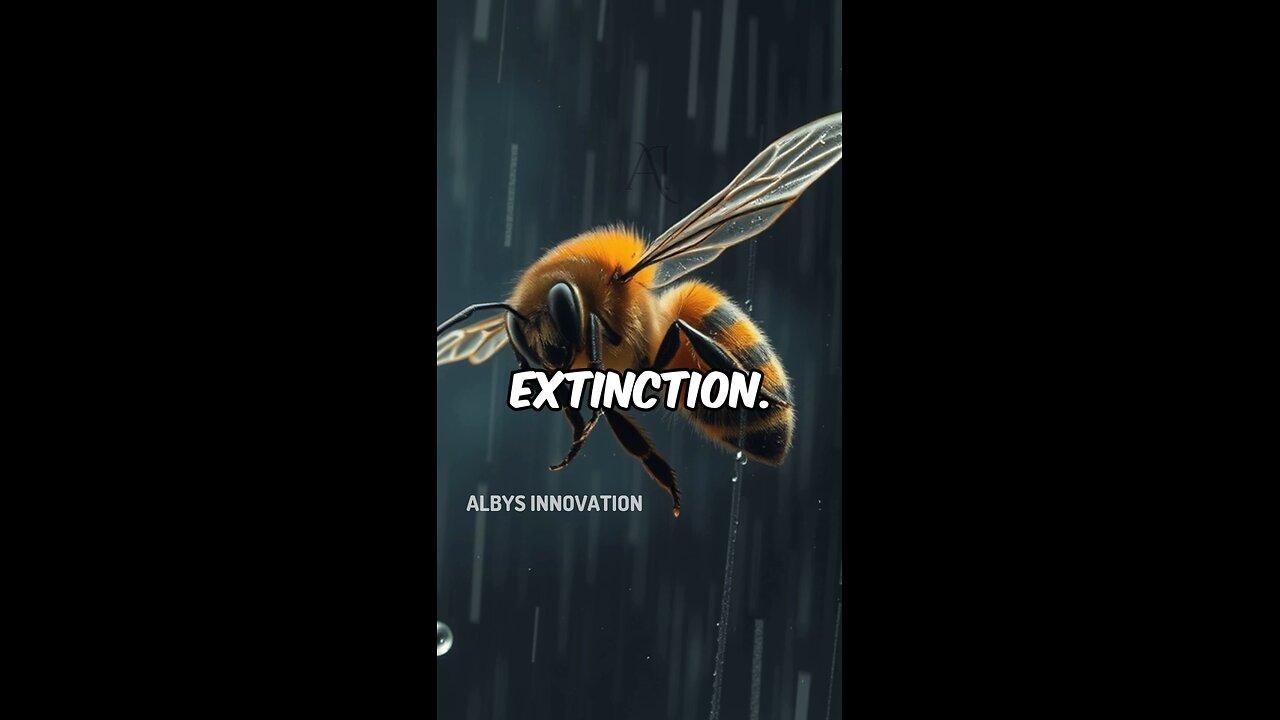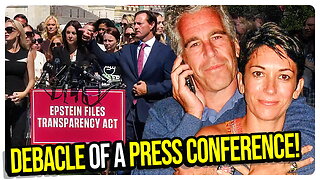Premium Only Content

Why Bees Are Dying (And Why It Matters) #Bees #Eco #Science
Why Bees Are Dying (And Why It Matters)
Introduction: The Alarming Truth About Bee Decline
Bees are disappearing at an alarming rate, and the consequences are far worse than most people realize. These tiny pollinators are responsible for one-third of the world’s food supply, yet their populations are being wiped out by pesticides, habitat destruction, and climate change.
If bees go extinct, it won’t just mean less honey—it could trigger a global food crisis. In this video, we’ll uncover the shocking reasons behind bee decline, how it impacts our planet, and what we can do to save the bees before it’s too late.
#SaveTheBees #BeeDecline #ClimateChange #Pollinators #EcoFriendlyLiving
⸻
1. Why Are Bees So Important?
Most people think bees are just honey producers, but their role is far more critical. Bees are key pollinators that help plants grow, reproduce, and provide food for countless species—including humans.
How Bees Support Life on Earth:
🌿 Pollination Powerhouse – Bees pollinate 75% of global crops, including fruits, vegetables, and nuts.
🐝 Ecosystem Balance – They help maintain biodiversity by pollinating wild plants.
🍯 Honey & More – Beyond honey, beeswax and royal jelly are valuable for medicine and skincare.
Without bees, food production would plummet, causing prices to skyrocket and leading to global hunger.
#PollinatorProtection #Biodiversity #FoodSecurity #SustainableAgriculture #NatureMatters
⸻
2. The Shocking Decline: Why Are Bees Dying?
In the last few decades, bee populations have dropped by over 40%, and some species are now endangered. The biggest threats? Human activity and environmental changes.
The Main Causes of Bee Decline:
❌ Pesticides & Chemicals – Toxic pesticides like neonicotinoids poison bees.
❌ Habitat Loss – Urbanization and deforestation destroy natural bee habitats.
❌ Climate Change – Rising temperatures disrupt flowering patterns and food availability.
❌ Diseases & Parasites – The deadly Varroa mite weakens bee colonies.
The combination of these factors is pushing bees toward extinction, threatening ecosystems worldwide.
#ProtectPollinators #BanPesticides #ClimateAction #BeeExtinction #EnvironmentalCrisis
⸻
3. How Pesticides Are Killing Bees
Modern agriculture relies heavily on pesticides, but many of these chemicals are deadly to bees. Neonicotinoids, a popular class of insecticides, damage bees’ nervous systems, making it harder for them to find food and return to their hives.
The Deadly Effects of Pesticides on Bees:
☠ Paralysis & Death – Even small doses of pesticides can kill bees.
🧭 Navigation Issues – Bees exposed to chemicals struggle to find their way home.
🐝 Colony Collapse Disorder (CCD) – Entire bee colonies mysteriously disappear.
Countries like the EU have banned some pesticides, but many are still used worldwide.
#PesticideFree #BeeFriendlyFarming #AgricultureReform #SaveWildlife #EcoConscious
⸻
4. How Climate Change Affects Bees
Climate change isn’t just about rising temperatures—it’s also affecting bee survival.
How Global Warming Hurts Bees:
🔥 Extreme Heat & Droughts – Bees struggle to find water and food.
🌎 Shifting Bloom Cycles – Flowers bloom too early or late, disrupting bee feeding.
🌪 More Storms & Natural Disasters – Destroy bee habitats and food sources.
If climate change continues at this pace, bee populations could decline even further, making food shortages a real possibility.
#ActOnClimate #ClimateCrisis #GlobalWarming #SustainableFuture #ProtectNature
⸻
5. The Impact of Bee Decline on Food Supply
If bees disappear, the consequences for global food production will be catastrophic.
What Would Happen Without Bees?
🚫 No More Fruits & Nuts – Crops like apples, almonds, and blueberries depend on bee pollination.
💰 Food Prices Will Skyrocket – Hand-pollination is expensive and inefficient.
🥗 Nutritional Deficiencies – Many vitamins and minerals come from bee-pollinated foods.
Some farmers have already turned to hand-pollination or robotic bees, but these solutions are costly and unsustainable.
#FoodShortage #SustainableFarming #BeesAndFood #FutureOfFarming #OrganicAgriculture
⸻
6. How Urbanization & Habitat Loss Harm Bees
As cities expand and wild landscapes shrink, bees lose their natural habitats.
How Humans Are Destroying Bee Homes:
🏗 Deforestation – Clearing forests eliminates wild bee colonies.
🏡 Urban Sprawl – Replacing green spaces with concrete leaves bees without food.
🌾 Monoculture Farming – Growing only one crop limits bees’ nutrition and survival.
Planting pollinator-friendly gardens and preserving green spaces can help restore bee habitats.
#Rewilding #UrbanGardening #PollinatorFriendly #SustainableCities #GreenSpaces
⸻
7. The Role of Honeybees vs. Wild Bees
Honeybees often get the most attention, but wild bees are just as important.
Key Differences Between Honeybees & Wild Bees:
🍯 Honeybees – Domesticated for honey production and large-scale pollination.
🌿 Wild Bees – Over 20,000 species provide natural pollination.
⚠ Threats to Both – Habitat loss, pesticides, and climate change impact all bee species.
Protecting both honeybees and wild bees is crucial for maintaining biodiversity and food security.
#WildBeesMatter #BeeBiodiversity #NatureBalance #ProtectAllBees #Ecology
⸻
8. How You Can Help Save the Bees
The good news? There are simple actions you can take to help protect bees.
Ways to Support Bee Conservation:
🌼 Plant a Bee-Friendly Garden – Grow native flowers and avoid pesticides.
🚫 Stop Using Harmful Pesticides – Opt for organic gardening methods.
🏡 Build a Bee Hotel – Provide shelter for wild bees in your backyard.
🛍 Support Ethical Beekeeping – Buy honey from responsible local beekeepers.
📢 Raise Awareness – Educate others about bee conservation.
Small actions, when multiplied, can make a big difference in saving bee populations.
#BeeFriendly #PollinatorProtection #GardenForBees #ConservationMatters #EcoWarrior
⸻
9. The Future of Bees: Can We Save Them?
The battle to save the bees isn’t over yet, but time is running out. Governments, scientists, and environmental groups are working on solutions, but real change starts with individuals.
What Needs to Happen Next:
🌎 Stronger pesticide regulations to protect pollinators.
🌳 More habitat restoration projects to support wild bee populations.
👩🌾 Widespread adoption of sustainable farming practices.
With the right actions, we can reverse bee decline and secure a future where both bees and humans can thrive.
#HopeForBees #FutureOfPollinators #EcoSolutions #SustainableFuture #ActNow
⸻
Conclusion: Why Bees Need You
Bees are more than just honey-makers—they’re essential to life on Earth. Their decline is a red flag for the environment, agriculture, and food security.
But you have the power to make a difference. By making bee-friendly choices, spreading awareness, and supporting conservation efforts, you can help save the bees before it’s too late.
🐝 What will you do to protect the bees? Let us know in the comments!
👉 LIKE, SHARE & SUBSCRIBE for more eye-opening content!
#SaveTheBees #ProtectPollinators #ActForNature #SustainableLiving #BeeAwareness
-
 LIVE
LIVE
vivafrei
2 hours agoEpstein Press Conference DEBACLE! Missing Minute FOUND? Canada Continues to Fall! & MORE!
12,285 watching -
 LIVE
LIVE
The Quartering
2 hours agoEpstein Victims To NAME People, Mutiny Over RFK Jr, Trump Turns On Warp Speed?
9,029 watching -
 LIVE
LIVE
Dr Disrespect
4 hours ago🔴LIVE - DR DISRESPECT - METAL EDEN - NEW 2025 SCI-FI FPS LAUNCH STREAM
1,533 watching -
 LIVE
LIVE
StoneMountain64
2 hours agoBattlefield's Easter Egg Phantom Project is STILL ALIVE
158 watching -
 LIVE
LIVE
Jeff Ahern
1 hour agoNever Woke Wednesday with Jeff Ahern
150 watching -
 13:43
13:43
The Kevin Trudeau Show Limitless
5 hours agoClassified File 3 | Kevin Trudeau EXPOSES Secret Society Brainwave Training
11.2K4 -
 LIVE
LIVE
SportsPicks
3 hours agoCrick's Corner: Episode 75
45 watching -
 1:06:30
1:06:30
LindellTV
1 hour agoMIKE LINDELL LIVE AT THE WHITE HOUSE
10.8K -
 1:05:33
1:05:33
Russell Brand
4 hours agoTrump Goes NUCLEAR on China - accuses Xi of CONSPIRING against US with Putin & Kim - SF627
111K41 -
 1:14:47
1:14:47
Sean Unpaved
3 hours agoTrey Wingo's Gridiron Grab
17.2K1